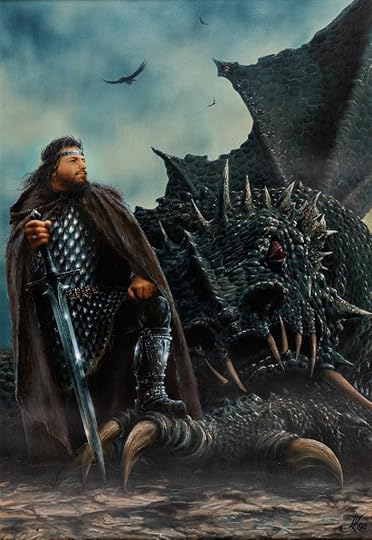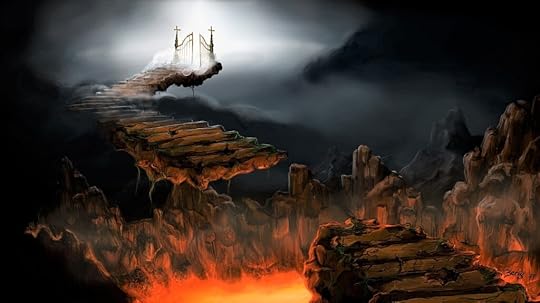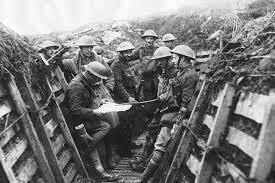Blind Read Through: J.R.R. Tolkien; The Book of Lost Tales, Part 2, Túrin Turambar Final Thoughts

“Turambar indeed had followed Nienóri along the black pathways to the doors of Fui, but Fui would not open to them, neither would Vefántur. Yet now the prayers of Úrin and Mavwin came even to Manwë, and the Gods had mercy on their unhappy fate, so that those twain Túrin and Nienóri entered into Fôs’Almir, the bath of flame, even as Urwendi and her maidens had done in ages past before the first rising of the Sun, and so were all their sorrows and stains washed away, and they dwelt as shining Valar among the blessed ones, and now the love of that brother and sister is very fair; but Turambar indeed shall stand beside Fionwë in the Great Wrack, and Melko and his drakes shall curse the sword of Mormakil (pgs 115-116).”
Welcome back to another Blind Read! This week, we’ll give some final thoughts on Turambar and the Foalókë, including some semantics and religion, to better understand what Tolkien was trying to do in this history of Middle-earth.
I chose the opening quote of this essay because I think that religion is at the cornerstone of everything that Tolkien was doing at this point in his career.
This story iteration was a mixture of the third and fourth drafts Tolkien’s son, Christopher, edited together. That quote that starts this essay has so much to unpack, and it’s all about meaning, life, and the afterlife.
A few sentences above that quote, we find that Úrin and Mavwin go to Mandos after dying, heaven in this world. Úrin spent his life struggling against Melko as a thrall and a man who tried to better those around him. Mavwin tried to do her best for all of her children and for the town she lived in. So, it makes sense that these two would be gifted an afterlife.

Túrin and Nienóri were denied entrance to Mandos, so they went to Fui and Ve, which are Purgatory and Hell, respectively. Strangely enough, they are also denied entrance to these places of the afterlife. So what does that leave them?
This might be the first time in the history of Middle-earth that the possibility of a spirit (or spirits) wandering the lands comes into play. The Valar looks at these two humans and decides they are not worthy of any afterlife because of their actions. Túrin with the deaths he caused, and Nienóri because she had a child with her brother and killed herself.
Judgement rains down on the two despoiled people from every direction. They hold themselves accountable and let depression and hatred of their actions lead them to suicide. At the same time, they feel the disgust of those around them, and even the Gods (in the form of Valar) tell them that they are not worthy of the afterlife because of their actions.
You must remember that Humans at this time were the only conscious beings living on Middle-earth who actively died (Elves could die from martial means, but otherwise, they are immortal, and the Valar are eternal gods), so damning a human to eternal torment of staying in the place of their transgressions and forever having those reminders was a cruel punishment.
This brings me to my next point: Tolkien wrote this as a tragedy of the tallest order, much more so than the story of Beren and Lúthien. To illustrate this, here is the literary definition of tragedy from Encyclopedia Britannica (forgive the pedantry).
“Although the word tragedy is often used loosely to describe any sort of disaster or misfortune, it more precisely refers to a work of art that probes with high seriousness questions concerning man’s role in the universe.”
Tolkien saw some horrible things during his lifetime. He spent years of his youth in the trenches of World War I and saw what bullets, mortars, and Mustard Gas did to people—this time had an indelible mark on his life and his writing. Many people think that his battle scenes are where his time at the Front comes into play, but to be quite honest, that could be imagination (I have written battle scenes, as have many authors who have never seen war).
I contend that what Tolkien took from World War I was instead a deeper perspective on humanity and tragedy.

The humans in Middle-earth had to come to grips with a shorter life span and thus had to work through their emotions of the knowledge of death faster than the Elves or the Valar.
That understanding echoes the real-life experiences in war and better explains the impetuousness of Túrin.
The Elves and Valar had the time to contemplate their actions and trajectories, but humans were born knowing they would die. That knowledge, living with beings that knew they couldn’t die, affected humans strangely. They strove to make a name for themselves; they aimed for meaning and legacy. Once someone gets a taste of notoriety, pride enters, and there is no more tremendous anger than damaged pride.
This is the start of Túrin’s fall and the beginning of his tragedy. He murders Orgof for being bullied, and though he is forgiven for this transgression, he is never able to forgive himself. His actions had to be more severe as he aged because a more significant action was the only way to make up for his earlier actions.
That is the true tragedy. Túrin, as all the people around him would probably attest, only ever wanted to help his fellow man and make the world better, but because of his past and his drive, it leads to wrong decision after bad decision, which creates murder and destruction in its wake.
Bringing this back to the definition of tragedy, this tale is only “high seriousness” and shows how mortality can change how people see the trajectory of their lives. Man’s mortality becomes the defining characteristic of their early existence on Middle-earth, and it takes them generations to come to grips with that mortality (which they never indeed do).
Then we layer on that Tolkien meant for these tales to be a mythology for England, kind of a pre-history of our current lives, and it shows how our ancestors dealt with fame, love, and mortality, which informs us as a culture and species moving forward.



